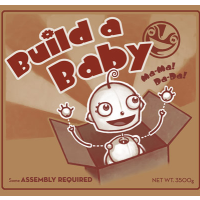Will New Patent Lead to “Designer Babies”?
 (graphic: Acme Archives Direct)
(graphic: Acme Archives Direct)
No…at least not yet. Although the decision last week by the U.S. Patent and Trademark Office (USPTO) to issue Patent No. 8,543,339 for “Gamete donor selection based on genetic calculations” has stimulated debate on the ethics of trait selection, genetic technology is many years away from Gattaca-style designer babies.
The method patented by 23andMe, a Mountain View, Calif., company founded by Anne Wojcicki, the now-estranged wife of Google co-founder Sergey Brin, introduces no new technology. Instead, parents-to-be whose DNA has been tested for various traits would access a database of sperm and egg donors whose DNA has also been tested, allowing the former to select a donor based on the odds of particular characteristics being expressed in potential offspring. Nothing but higher odds is, or could be, promised.
In fact, 23andMe already uses the technology to power similar odds-making device, called the Family Traits Inheritance Calculator, which shows prospective parents which traits their offspring are most likely to inherit. The patent does little more than propose a “light,” lower-cost version of genetic screening, which is already widely used to screen embryos for inherited diseases.
Nevertheless, the potential of “designer babies” and the history of eugenics concerns many bioethicists.
“This project could foster the false belief that biology trumps social, economic and environmental conditions in influencing our health and well-being. And it could encourage the dangerous idea that science should be used to breed ‘better’ people, breathing new life into the specter of eugenics that has long hung over the field of genetics,” said Marcy Darnovsky, executive director of the nonprofit Center for Genetics and Society.
The Center has publicly urged 23andMe “to abstain from developing or offering any product or service based on this patent, and to use its patent to prevent others from doing so.” On the other side of the Atlantic, a group of European geneticists similarly criticized the “hugely ethically controversial” issues raised by the patent,
For its part, 23andMe responded by arguing that the company uses the patented technology only in its Family Traits Calculator and that despite the broad scope of the patent application, “the company never pursued the concepts discussed in the patent beyond our Family Traits Inheritance Calculator, nor do we have any plans to do so.”
Nor does the granting of this patent create a slippery slope toward designer babies. Under USPTO guidelines, the agency will not patent inventions that are “offensive to public morality,” a rarely invoked rule that the office cited in rejecting a patent application for the right to make a human/animal chimera.
-Matt Bewig
To Learn More:
Designer Baby-Making System Patent Stirs Controversy (by Cameron Scott, Singularity Hub)
23andMe’s Designer Baby Patent is ‘a Serious Mistake,’ Critics Charge (by Karen Kaplan, Los Angeles Times)
23andMe’s “Designer \Baby” Patent: When Corporate Governance and Open Science Collide (by Barbara Prainsack, genomesunzipped)
- Top Stories
- Unusual News
- Where is the Money Going?
- Controversies
- U.S. and the World
- Appointments and Resignations
- Latest News
- Trump Renames National Football League National Trump League
- Trump to Stop Deportations If…
- Trump Denounces World Series
- What If China Invaded the United States?
- Donald Trump Has a Mental Health Problem and It Has a Name






Comments